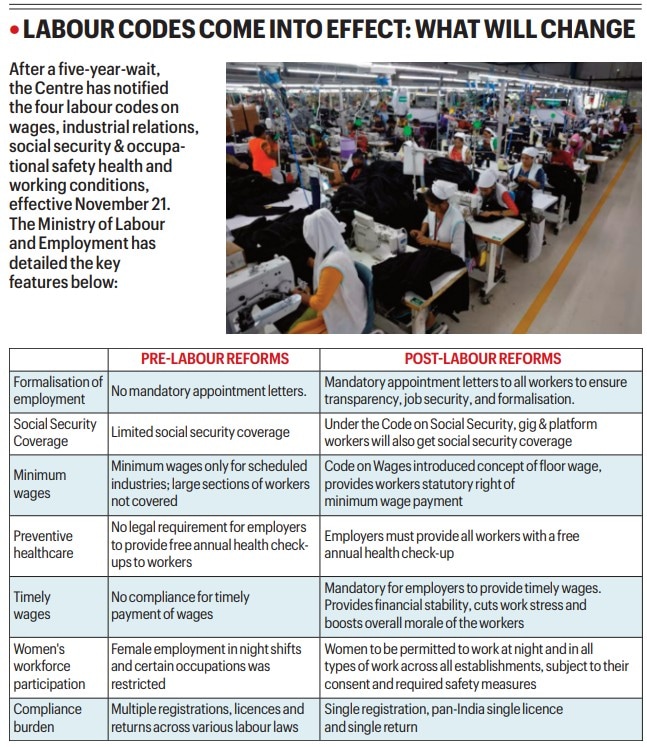Expressing keen interest in new labour codes, Director-General of the International Labour Organisation, Gilbert F. Houngbo, in a social media post, said social dialogue among government, employers and workers will remain essential as reforms are implemented to ensure they’re positive for workers and business.

The key areas of impact which employers should prepare for include mandatory annual health check-ups, gratuity entitlement for fixed-term employees, social security benefits for gig and platform workers, and stricter requirements around timely wage disbursement, Akhil Chandna, partner, Global People Solutions Leader, Grant Thornton Bharat, said.

“Although the industry had anticipated a transition period, the notification makes the implementation immediate. Employers across sectors should therefore promptly assess and align their internal policies, HR practices, and operational processes with the applicable provisions of the Codes. A review of compensation and benefits structures will also be essential, particularly in light of the revised and uniform definition of ‘wages’ under the new framework,” Chandna said.
Likely pause in misuse of employment norms
India’s largest IT industry association Nasscom said the government’s notification bringing key provisions of the labour codes into effect marks a significant moment in India’s labour reform journey.
“The transition is sequenced and provides continuity, allowing organis- ations time to understand the notified provisions and prepare for future stages of implementation. The codes aim to expand social security, strengthen workplace safety, improve wage clarity and support wider participation in the workforce,” Nasscom said.
However, industry representatives said enforcement of the code is key as the IT sector particularly faces widespread misuse of contract norms.
Story continues below this ad
“The IT sector already faces widespread misuse of fixed-term roles, probation extensions, forced resignations and classification of employees as ‘consultants’ to avoid benefits. If the rules are not framed and enforced carefully, companies may restructure contracts to bypass obligations. Trade union rights also need to be preserved because, without collective representation, employees in the technology sector may not be able to assert the protections promised to them,” Harpreet Singh Saluja, president, Nascent Information Technology Empl- oyees Senate (NITES).
Nasscom said that for the technology sector, clearer employment documentation, parity of benefits for fixed-term workers, expanded social security, and structured grievance mechanisms offer the potential for greater predictability and mobility. These changes can support a skilled workforce and reinforce India’s position as a hub for high-value digital and technology services, it added.
New codes bring clarity & digitisation
Teamlease Vice Chairman Manish Sabharwal said, the new labour codes are an overdue gift to India’s young women, factories, MSMEs and backward states. “But the self-interest of the vocal minority labour aristocracy cannot be considered national interest in a country where 65 per cent of our population is less than 35 years old. It is a major reform that will accelerate formal, non-farm, high-productivity job creation.”
A spokesperson for Uber said the cab aggregator welcomes the government’s move to implement the new labour codes, including the Code on Social Security. Uber looks forward to working closely with the government to ensure the speedy and effective implementation of these reforms.
Story continues below this ad
“The implementation of India’s four new Labour Codes will simplify compliance for employers, reduce regulatory burdens, and foster a more flexible hiring environment. These reforms will accelerate the formalisation of India’s workforce, boost the ease of doing business, and drive formal employment growth,” said Suchita Dutta, executive director, Indian Staffing Federation (ISF).
Puneet Gupta, partner, People Advisory Services, EY India, said that unlike earlier laws that had multiple interpretations and overlapping authorities, the new codes bring clarity, digitisation, and consistency across compliance requirements.
“For workers, the impact is significant, formal employees gain stronger protections and uniform benefits, while gig and platform workers are included in social security schemes for the first time. This transformation will reshape compensation structures, HR policies, and employment models, creating a more inclusive and future-ready labour ecosystem,” Gupta said.


































